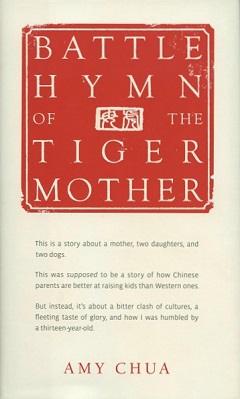Battle Hymn of the Tiger Mother
 |
|
| Author | Amy Chua |
|---|---|
| Country | United States |
| Language | English |
| Subject | Family and parenting |
| Genre | Education, parenting, memoir |
| Publisher | Penguin Group |
|
Publication date
|
2011 |
| Pages | 240 |
| ISBN | |
Battle Hymn of the Tiger Mother is a book by American author and lawyer Amy Chua that was published in 2011. The complete blurb of the book reads: "This is a story about a mother, two daughters, and two dogs. This was supposed to be a story of how Chinese parents are better at raising kids than Western ones. But instead, it's about a bitter clash of cultures and a fleeting taste of glory."
The original book became the inspiration for the Chinese drama Tiger Mom, which premiered on Dragon TV and Tianjin TV in mainland China on May 3, 2015.
An article published under the headline "Why Chinese Mothers Are Superior" in the Wall Street Journal on January 8, 2011, contained excerpts from her book, in which Chua describes her efforts to give her children what she describes as a traditional, strict "Chinese" upbringing. This piece was controversial. Many readers missed the supposed irony and self-deprecating humor in the title and the piece itself and instead believed that Chua was advocating the "superiority" of a particular, very strict, ethnically defined approach to parenting. In fact, Chua has stated that the book was not a "how-to" manual but a self-mocking memoir. In any case, Chua defines "Chinese mother" loosely to include parents of other ethnicities who practice traditional, strict child-rearing, while also acknowledging that "Western parents come in all varieties", and not all ethnically Chinese parents practice strict child-rearing.
Chua also reported that in one study of 48 Chinese immigrant mothers, the vast majority "said that they believe their children can be 'the best' students, that 'academic achievement reflects successful parenting', and that if children did not excel at school then there was 'a problem' and parents 'were not doing their job'". Chua contrasts them with the view she labels "Western" – that a child's self-esteem is paramount.
In one extreme example, Chua mentioned that she had called one of her children "garbage", a translation of a term her own father called her on occasion in her family's native Hokkien dialect. Particularly controversial was the 'Little White Donkey' anecdote, where Chua described how she got her unwilling younger daughter to learn a very difficult piano piece. In Chua's words, "I hauled Lulu's dollhouse to the car and told her I'd donate it to the Salvation Army piece by piece if she didn't have 'The Little White Donkey' perfect by the next day. When Lulu said, 'I thought you were going to the Salvation Army, why are you still here?' I threatened her with no lunch, no dinner, no Christmas or Hanukkah presents, no birthday parties for two, three, four years. When she still kept playing it wrong, I told her she was purposely working herself into a frenzy because she was secretly afraid she couldn't do it. I told her to stop being lazy, cowardly, self-indulgent and pathetic." They then "work[ed] right through dinner" without letting her daughter "get up, not for water, not even for bathroom breaks". The anecdote concludes by describing how her daughter was "beaming" after she finally mastered the piece and "wanted to play [it] over and over".
...
Wikipedia
